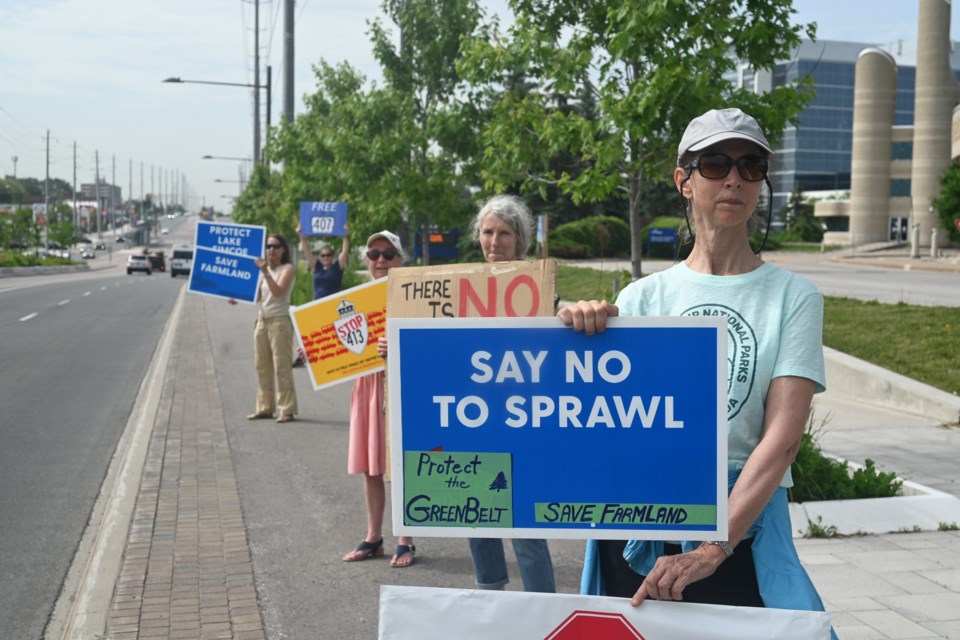Stop Sprawl York Region member Claire Malcomson said she did not want to waste her time today in York Region council chambers.
Instead, she and eight others gathered outside the regional headquarters in Newmarket to protest the endorsement of the new official plan June 16. Councillors ultimately voted to endorse the plan, though it will still need final ratification at a council meeting later this month.
She and other environmental advocates have pushed against York Region's direction for months, concerned by the amount of urban expansion being allowed over the next 30 years.
“I feel like I have nothing else to say (to council),” Malcomson said, adding that many of the protestors have presented to council but have not been able to get changes made to the document. “It’s symbolic. We’ve been trying really hard, we’ve put a ton of energy ... We’re getting nowhere.
“They are voting for as much sprawl as they can get away with,” she added. “Sprawl is the problem, it is not the solution to the problem.”
The regional official plan will guide the next 30 years of regional development, up to 2051. The plan lays out that 50 per cent of development will occur in built-up lands, phasing up to 55 per cent after 2041, with the remainder happening through urban boundaries expansion, also known as urban sprawl.
The plan is meant to accommodate significant growth expected for the region over the next 30 years but has received criticism due to the loss of farmland and the environmental issues associated with urban expansion.
Angela Grella, also of Stop Sprawl York Region, said she does not feel like their voices are being heard.
“The citizens of York Region are being shut down,” she said, adding that builders “are being taken more into account, and we need more transparency.”
Newmarket Mayor John Taylor voted against the official plan, with Newmarket council also expressing opposition to it. He said the rate of intensification was too low, resulting in too much-undeveloped land being designated for development.
“We are choosing sprawl over intensification. The data, the math, the science is clear: sprawl is not sustainable,” Taylor said, adding the sprawl would cost the region more to service and also runs counter to efforts to address climate change. “We cannot afford to be so unambitious.”
Not all regional residents feel that way. The East Gwillimbury Whitebelt Landowners Group had a delegation to council, with Matthew Cory complimenting the plan on their behalf.
“I really want to thank you for moving ahead with this official plan,” he said, adding there are still some discussions to be had on matters like the Upper York Sewage Solutions. “I’m sure that those can be addressed.”
Many other groups and individuals did opt to make delegations to council, whether in support or opposition to the plan or to address specific aspects of it. The region also had 25 pieces of written correspondence included in the agenda.
The region is planning to pass the plan by the end of the month to meet a provincial July deadline.
Although advocates have not been unable to get York Region to budge on the trajectory of its current plan, Malcomson said they plan to keep pushing even after it gets passed. She said groups like hers advocate for things like good, affordable housing and dense development.
“The developers should not be in control, and that’s what it looks like is happening,” she said. “That needs to change.”
